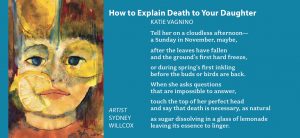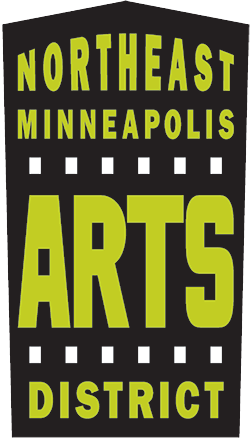
Written by Mark Peterson
Along with 25,000 books, Scott VanKoughnett’s Eat My Words bookstore holds four to six literary-related events a month, including poetry workshops and author visits. On Saturday, February 22, people attending got a bit of both.
The event’s title, “Powerful Female Poets,” should get an award for truth in advertising. Each of these (currently local) poets got a chance to stand up straight and tell the truth, and each of them did. The intimate space in the back of the store, with its two dozen folding chairs pressed against the book stacks, didn’t seem large enough to hold the voices as they read old and new work.
The range of topics was remarkable: poisoned water, infertility, killing chickens, immigration, explaining death, the Cambodian diaspora, childbirth, thoughts of the mother of Icarus, homelessness, and how to deal with the Apocalypse.
Isadora Gruye is a writer, photographer, the editor and co-founder of Nice Cage Literary Magazine, a Loft Mentor Series alum, and a regular with the Rolling Thunder Poetry Review. Gruye has appeared in several anthologies and is the author of The Ladies’ Guide to the Apocalypse. The book’s tagline is “Half lullaby. Half battle cry. All doomsday heart.” Gruye (who calls herself Izy) says she holds a nine-to-five job because “I have to pay the bills. It seems these days we’re either napping or fighting, and I’m trying to strike a balance of what to do when.”
She opened with “Doomsday Heart Writes Your Origin Story”:
“I’ll be your doomsday heart, your reminder that structure crumbles so easily the brick, water, these city streets, firehouses, cellar doors, underground tunnels, you grope for it, coral reef unshelf, all subject to spoil . . .”
Katie Vagnino is a poet, educator, and freelance writer from St. Louis. Her poetry has appeared in several literary journals, including Measure, Unsplendid, The Raintown Review, and Poetry City, USA. In 2017, her poem “How to Explain Death to Your Daughter” was featured on Metro Transit buses and trains in the Twin Cities. Katie has an MFA from Emerson College and has taught creative writing at UW-Eau Claire and the Loft, and can be found leading a poetry workshop at Boneshaker Books on the first Wednesday of every month. Katie is also the co-founder of Post-It Poetics, a guerrilla poetry project whose mission is to “cover the world in poetry, one Post-It at a time.”
Vagnino said she was glad to be a part of the evening’s “team of powerful women,” but added, “We are not a monolith.” She said she doesn’t have a book, but read from manuscripts that might someday become one. She began with “How to Explain Death to Your Daughter:”
“Tell her on a cloudless afternoon –/a Sunday in November, maybe,/after the leaves have fallen/and the ground’s first hard freeze,/or during spring’s first inkling/before the buds or birds are back./When she asks questions/that are impossible to answer,/touch the top of her perfect head/and say that death is necessary, as natural/as sugar dissolving in a glass of lemonade/leaving its essence to linger.”
Peuo Tuy is a Cambodian-American spoken-word poet from Lowell, Massachusetts, a city with the second-largest Cambodian population in the U.S. Her self-published storytelling poetry book, Khmer Girl, confronts the Cambodian genocide, refugee camps, her emigration to the United States at age four, and her life since. She is a founding member and the executive director of the new Cambodian American Literary Arts Association, a nonprofit literary arts association dedicated to the cultivation, visibility, and freedom of expression of emerging and established writers in the Cambodian diaspora. She holds a bachelors of arts in Africana/Puerto Rican/Latino studies and a minor in Asian American studies and is in a masters degree program here in Minnesota.
Tuy read “The First Decades of the Diaspora Experience”:
“We were dropped in the ghetto/co-habited with the Puertorriquenos, Domicanos,/Blacks, Laotians, Vietnamese./Section 8 homes saved us from being on the streets,/ Public welfare, food stamps fed and clothed us./We learned the five elements of hip hop while/ bobbing our heads to Tupac, Biggie Smalls./Rapping about gansta lifestyle and the streets./ Deejaying to the sounds of Rap, Rhythm, & Blues,/Freestyle, Jazz, Dance, House./ B-Boying – toprock, downrock, power moves, freezes/ – we got attitude./Graffiti painting our lives on torn buildings – gang/ signs with red, blue, brown colors./Beatboxing – mimicking drum machines – we got/ style./ Khmer young girls and ladies rockin’ red purple baggy jeans, cropped tops./ Hair lookin’ like Cyndi Lauper and Madonna./Big hoop earings, impressin’ da boys./ Children hair done French fish braids play hopscotch,/halfhopped over elastic-band jump ropes/Elders sell $5 lemongrass-marinated beef sticks,/spicy fermented crab papaya salad. Lao sticky white rice./Men play soccer, volleyball.”
Sonia Greenfield was born in Peekskill, New York, and has lived in Seattle, San Francisco, Los Angeles, and currently, Minneapolis. Greenfield has been the director of The Southern California Poetry Festival and editor of Rise Up Review. Her chapbook, “American Parable,” won the 2017 Autumn House Press/Coal Hill Review Prize. Her first full-length poetry collection, Boy with a Halo at the Farmer’s Market, won the 2014 Codhill Poetry Prize.
She said, “I’m going to be the ‘Fierce Mom.’ We’ve never heard from Icarus’s mother, Nafiscrate, and I thought that it was time.”
“Nafiscrate Considers Brueghel’s Famous Work”
“I told Daedalus to watch him goddammit/so now here I am waiting for my son/ to breaststroke home to me held up on fingers/ of green foam wading past the rise and fall/ of Rome through to Pieter’s brushwork/which rendered the sun like a lemon on fire/ some stupid ploughman hogging the canvas/the plunge just a few flicks of horsehair/ in ochre
“I have waited until the ship’s sails/ became rags, until metal replaced wood./ motors replaced oars, I said you can’t trust children/ to make good choices so watch him. Do you see/ how Pieter painted the toes pointed to the sky?/ I taught my boy how to dive like that. Every/ summer day until his teeth were chattering/ and lips tinged purple, he learned crawl and kick/ Trembling over the water like a bent marigold,/ he learned how to tip into the cold tarn/hands in prayer and head, first my minnow/ cutting ahead and again through the blue./ Let the seas dry to muddy puddles. Let/ the wheat fields go to dirt. My God,/ what’s a mother to do? I’m leaving on/ my porch light, I expect Icarus home soon.”
She also read from her to-be-released book Letdown, a piece on infertility, motherhood, and having a special-needs child:
“I want to describe it, to tell the whole story. That the birthing suite and its muted walls were details lost in rage. That the Joni Mitchell I played―the candy of her voice―could not be heard over my retching. That all the ways I thought I had prepared were like closing a slider on a tsunami. That I couldn’t listen to myself whimper anymore, the anesthesiologist floating to me like a goddess in institutional blue while I leaned over, trembling, as the thick, blissful needle slipped deep into my back while I hugged the ball of you. That this is the point where what was should overlay on top of what should have been. That your heart decelerated, machines binged, and your father fetched the nurse. That nurses and doctor rocked my dead legs back and forth to dislodge you. That I had to push you out before full dilation, my cervix torn. That the doctor was stitching for so long. That you, glistening violet, would look me in the face. That the minute you latched on, I became remade in your image. That I would have liked to do it again. That by the time it was possible, I couldn’t.”
Ethna McKiernan has been twice awarded a Minnesota State Arts Board grant in poetry, most recently in 2011 for the completion of Sky Thick with Fireflies. McKiernan’s first book, Caravan, was a Minnesota Book Award nominee. She ran an Irish book distribution business (Irish Books and Media) for over two decades and has worked the past four years as a volunteer with St. Stephen’s Social Services, dealing with the homeless. Her fourth book, Swimming in Shadows, was published in 2019.
She read from her third book, Sky Thick with Fireflies (Salmon Poetry, 2012).
“The men in the basement are tired,/ they say, of working without a contract./I’ve heard their low grumbles in the evenings/ as I read by the stove and the word union/ has slipped through the floorboards once or twice./ It was easier when there was just one –/ mild, handsome Jack who fixed the faucets when they leaked, bled the radiator pipes in Fall/ hung paintings on the bedroom walls,/ and was happy with a plain pork chop dinner,/ dessert a few nights a week./Then Ted knocked one night, his bag of metaphors/ slung on one shoulder the whole bright alphabet/ spilling on the threshold. Because the house repairs/ were caught up and because the poem/ I was working on was a little bare, I let him in./ We talked till dawn in the kitchen and I swore/ I’d only borrow what I needed from his bag,/ and made another bed up in the basement./ These days it seems a little servicing/ will only go so far. the philosopher complains/ I no longer help him wring meaning/ from the stars, the accountant disapproves/ of the red ink in my books, and my handyman/ threatened to move on today when he found/ the poet in my bed tucking images inside my pillow/. The trouble with fantasies is that/ they become unwieldly, swelling into great,/ lumbering bears with large paws who outgrow their downstairs beds/ and begin to roar or more food more/ attention, more me. I hate to add/ a locksmith to the mix but/ I need one for that basement door.”
